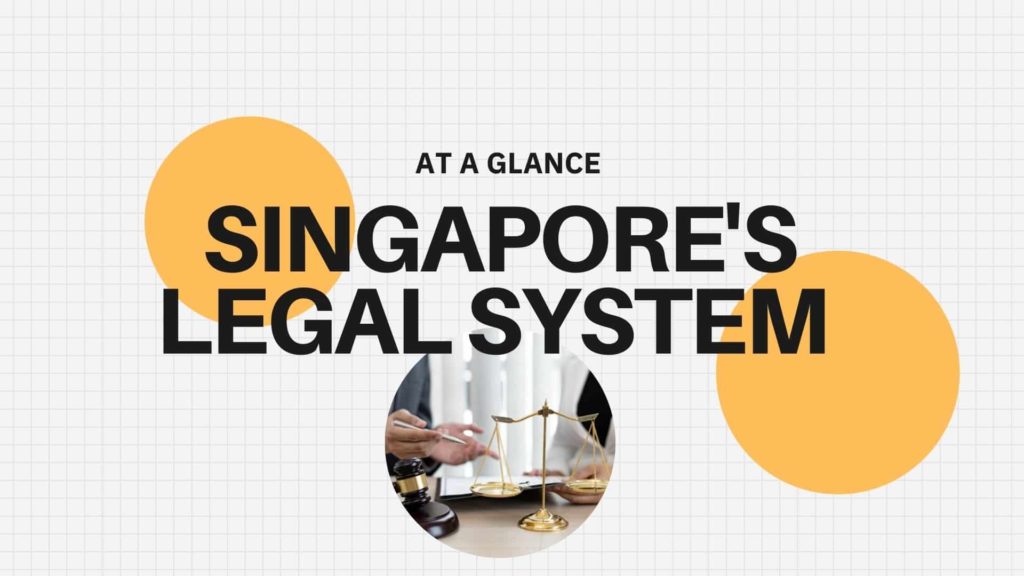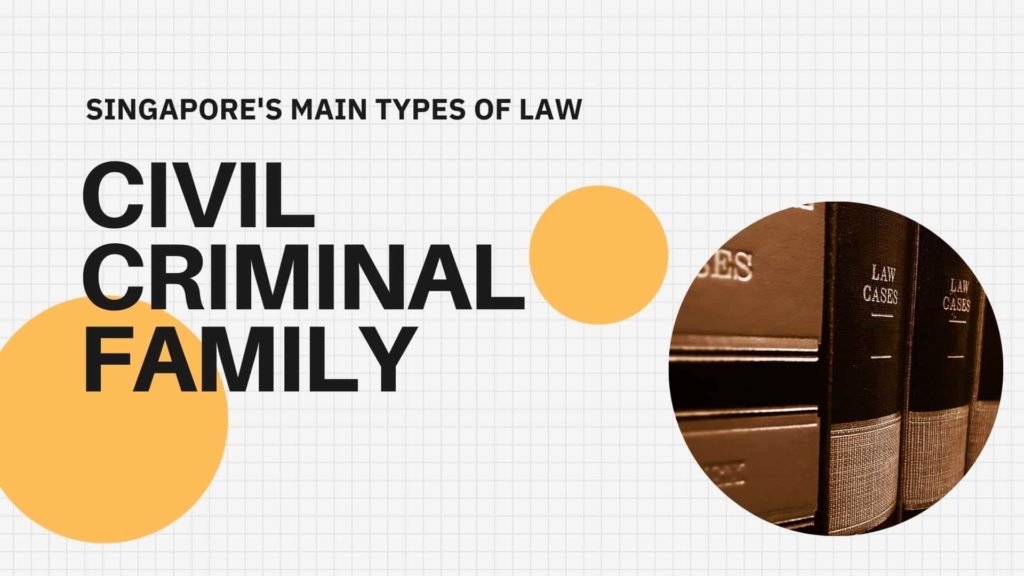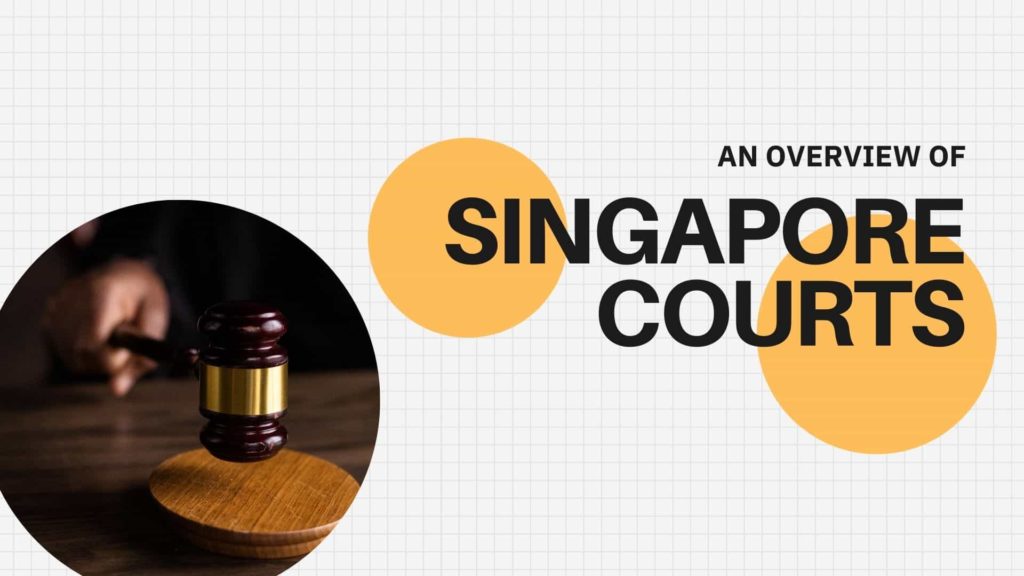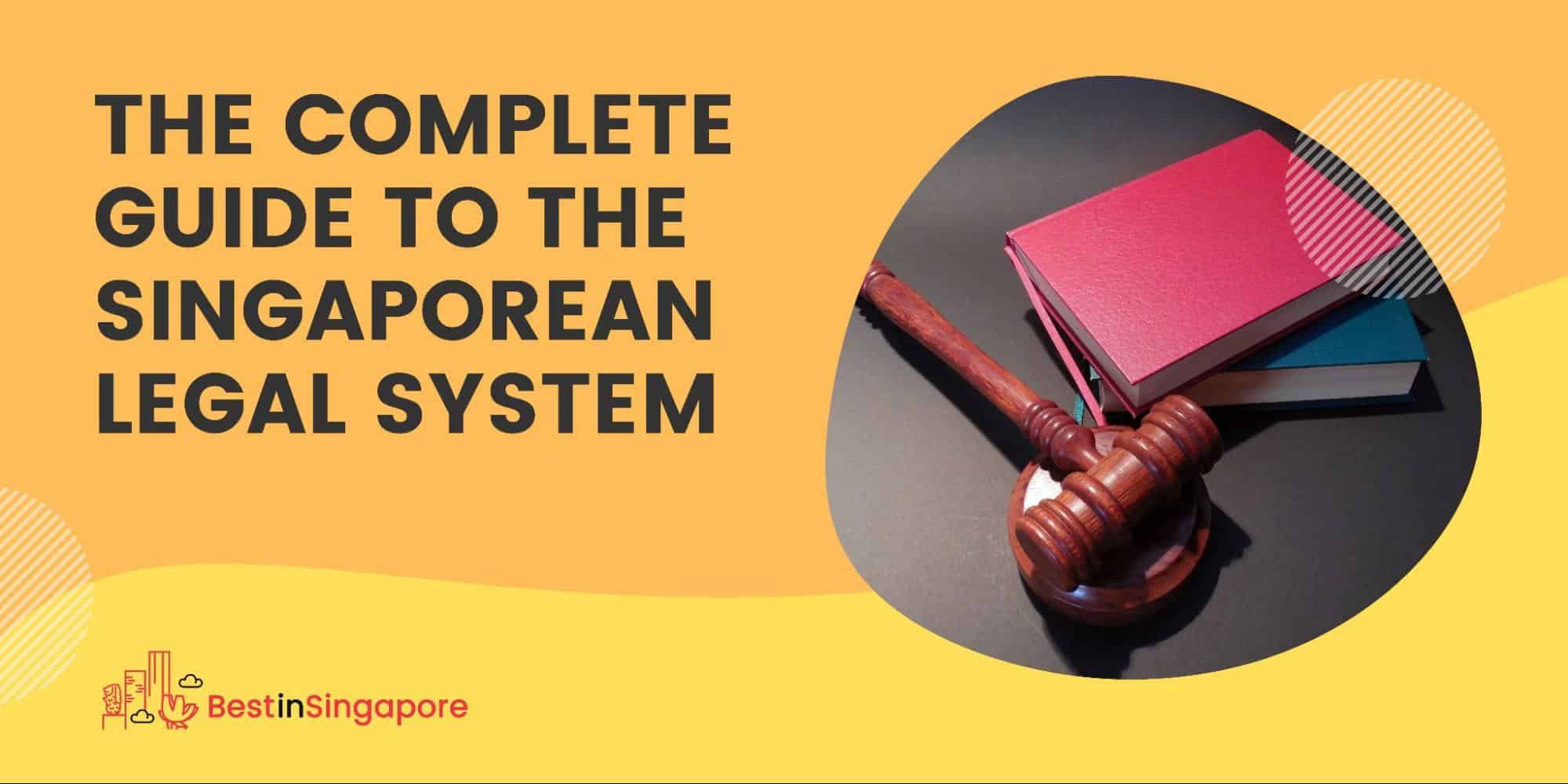The Complete Guide to the Singaporean Legal System
As they say, ignorance of the law excuses no one, which is why we came up with a complete and simplified guide to Singapore’s legal system—perfect for those who have recently relocated here or locals who need a refresher.
We’ll cover the essential things you need to know, from the nuances of courts to the main types of law that your case may fall under. So if you’re ready, let’s start!
An Overview of Singapore’s Legal System

According to the Ministry of Law, Singapore is a republic that adopts a parliamentary form of government based on the Westminster Model. So, while Singapore’s legal system has changed over time, it can trace its roots back to the English legal system.
Singapore’s legal sources include the Constitution, legislation, subsidiary legislation (such as Rules and Regulations), and common or judge-made law. Not sure what those mean? We’ll break those down one by one:
Constitution – This is also considered the supreme law of Singapore. It sets the framework for the three branches of government, namely the executive, legislature, and judiciary as detailed below.
Singapore exercises a system of checks and balances to ensure equal balance of power among all three branches of government.
Legislation – Legislation is divided into statutes or subsidiary legislation. Statutes are written laws enacted by the parliament, plus other relevant bodies.
A draft legislation, known as a bill, is debated in parliament first and must go through three readings before gaining the President’s approval. Once secured, it becomes an Act of Parliament, which creates a new law or makes changes to an existing law.
For instance, the Animals and Birds Act sets the rules on controlling the movement of animals, birds or fish into, within and from Singapore.
Subsidiary Legislation – This is a written law enacted by ministers or other administrative bodies such as government departments and statutory boards, rather than the parliament. It has to be made under a statute to take into effect.
For instance, the Animals and Birds (Dog Licensing and Control) Rules under the Animals and Birds Act lists down the requirements necessary for owning a dog in Singapore. For example, you’ll need to secure a licence in order to keep a dog.
Common (Judge-made) Law – Judgments and legal decisions made by the courts are considered a source of law. These are also known as judicial precedents.
For easy online access, you can check out Singapore’s complete list of legislation on this website.
Types of Law

Now that you have a general idea of Singapore’s legal system, the next step is to understand the main types of law. It’s important to understand how they differ from each other so you know what kind of case to file if needed and of course, the type of lawyer to approach.
In Singapore, the courts are divided according to civil, criminal, and family cases. This will make it easier for individuals to know which court to approach.
Civil
In broad terms, civil law refers to the rights of individuals and entities like companies. In general, it involves settling disputes between parties involving properties, people’s relationships, and business agreements, among others.
When it comes to possible outcomes, the parties that are deemed at fault will have to pay a fine or comply with court orders.
There are three courts that deal with civil cases, namely the State Courts, High Court, and Court of Appeal, which will depend on the claims of the lawsuit.
In legal terms, the plaintiff (or the accuser) files a lawsuit against a party who is defending the case, who is also known as the defendant. The process of taking legal action is called litigation, or civil litigation in this case.
Because litigation can be an expensive and long undertaking, be sure to consider all possible remedies before thinking about pursuing a lawsuit.
Some considerations to take into account include you and your defendant’s financial resources, your claims, goals, and court deadlines, among others. If you’ve exhausted all remedies and are set to pursue a case, then the next step is to hire a lawyer.
For general litigation, you might want to contact a litigation lawyer if you aren’t sure which lawyer specialises in your particular case. On the other hand, you might also want to directly contact a lawyer who specialises in your case to save time.
Some issues that can be considered under civil law are the following:
- Corporate matters
- Employment issues
- Intellectual property
- Neighbour disputes
- Property issues
- Debt
- Bankruptcy
- Commercial disputes
- Immigration issues
- Personal injury
Criminal
Criminal cases are more serious in nature, yielding more severe forms of punishment for those found guilty. Some common criminal cases involve theft, murder, kidnapping, assault, rape, drug misuse, and many more.
The Penal Code is the main point of reference for criminal law in Singapore. It includes guidelines on criminal offences, as well as their respective punishments and penalties.
Note that not all offences are listed in the Penal Code. There are other statutes including the Kidnapping Act and Misuse of Drugs Act, for instance.
Technically, one doesn’t really file a criminal case against another person because only the state may do so. A criminal proceeding begins once an arrest, summons, arrest warrant, or a notice to attend court has been issued.
Otherwise, you can also file a complaint against someone that may result in a criminal proceeding. The first step is to file a police report.
If the police didn’t pursue your case, you can file a Magistrate’s Complaint to the court. And if a magistrate finds sufficient reason to proceed with the complaint, then the criminal proceeding will begin.
Because there are so many criminal offences that can be tried in Singapore, the best course of action for an accused person is to hire a criminal lawyer to defend them throughout the proceeding.
Generally, the High Court handles more serious criminal cases, which has the jurisdiction to prosecute individuals charged with cases that may be punishable by death.
Family
Family cases are generally considered as civil cases. But in Singapore, they’re handled by a separate court called the Family Justice Court.
This is why they’re also talked about independently when it comes to the types of law practised in Singapore.
As you can guess by its name, family law deals with all legal matters related to families and the youth. It covers, but not limited to, the following subjects:
- Adoptions
- Divorce
- Expat divorce
- Annulment
- Children’s issues including abuse
- Division of matrimonial property
- Personal protection orders
- Probate
- Maintenance/financial support
- Protection for vulnerable adults
There are two sets of family law that Singapore practises: one for Muslims and one for everyone else. For instance, the Syariah Court has jurisdiction over divorces made under Muslim law.
A party may also enforce Syariah Court orders in the Family Justice Court against those who violate the said order. In the same vein, there are also Syariah lawyers in Singapore specialising in Syariah law cases, from divorce to inheritance.
Your case may be heard by a district judge, magistrate, or assistant registrar in the Family Courts and Youth Courts. District judges are more experienced and have the authority to handle more serious matters.
One important thing to know about family law in Singapore is that it focuses on “a just and amicable outcome, and is not as adversarial as other types of law,” as noted by the judiciary.
In other words, they also provide court mediators as an alternative to resolve family disputes. There are also counselling services available to those who need it.
Otherwise, it’s best to hire a lawyer specialising in family law for more serious cases. It’s not always feasible to hire a lawyer though, and this will ultimately depend on your resources and severity of the case.
Types of Courts

With all this talk about the law, you may be wondering more about which courts to go to for a case.
As briefly mentioned above, the judiciary branch consists of the Supreme Court and State Courts. Understanding the hierarchy and the nuances of these courts will save you time from knowing which one to approach in case you’re being sued or are planning to sue someone.
This section will discuss the courts available, including a general overview of the issues and circumstances they deal with.
Supreme Court
Headed by the Chief Justice, the Supreme Court is the highest court of the land. It’s divided into the Court of Appeal and the High Court, both of which deal with criminal and civil matters.
Court of Appeal
The Court of Appeal is the upper division of the Supreme Court. It normally consists of three justices: the Chief Justice, who is the president of the court, as well as the Judges of Appeal, who technically serve as vice presidents of the court.
The Court of Appeal can only exercise appellate jurisdiction in civil and criminal matters. In simpler terms, the court can only review and reverse the decisions made by lower courts, particularly cases that have been appealed from the High Court and State Courts.
The court doesn’t hear first-time trials of any kind. Basically, they use evidence that has been identified in lower courts in order to come up with a new decision, whether it’s overruling/retaining the previous verdict or ordering a new trial.
You can file an appeal within one month if you disagree with a judgement, order, or decision made by a judge in the High Court. Take note that not all court decisions can be appealed to the High Court.
However, there are some cases that can be appealed as long as the court grants you a leave (or permission), which you have to apply for. You can check out the details on the judiciary’s website.
High Court
The High Court is the lower division of the Supreme Court, consisting of a Chief Justice and other associate Judges. They’re responsible for hearing criminal and civil matters.
Unlike the Court of Appeal, they can hear first-time cases. Apart from that, the court also hears appeals from the decisions of lower courts, namely the District Court and Magistrates’ Court.
The High Court has the authority to try all crimes committed in Singapore, as well as crimes committed in the following circumstances:
- On board any ship or aircraft registered in Singapore;
- By any person who is a citizen of Singapore on the high seas or on any aircraft;
- By any person on the high seas where the offence is piracy by the law of nations;
- By any person within or outside Singapore where the offence is punishable under the Hijacking of Aircraft and Protection of Aircraft and International Airports Act or the Maritime Offences Act; and
- In any place or by any person if it is provided in any written law that the offence can be trailed in Singapore.
In practice, the High Court only hears cases with a potential minimum sentence of over 10 years imprisonment, or capital punishment (i.e. the death penalty). Generally, they also hear cases with claims that exceed $250,000.
Civil or criminal matters that don’t satisfy these criteria should be raised to the State Courts first.
State Courts
The State Courts represent the other tier of Singapore’s judiciary branch. The State Courts include the District Court and Magistrates’ Court, both of which also handle civil and criminal cases that aren’t applicable to be tried in the Supreme Court.
The State Courts also include tribunals or courts specialising in hearing specific cases including but not limited to family, juvenile, and employment matters.
District Court
The District Court handles civil cases involving claims of more than $60,000 but not exceeding $250,000. Moreover, the court can also hear criminal cases involving offences that carry a maximum sentence of 10 years in jail or fines.
The court has the power to make the following sentences:
- A maximum jail sentence of 7 years
- A maximum fine of $10,000
- Administer up to 12 strokes of caning
- Reformative training
- A combination of the above
Magistrates’ Court
On the other hand, the Magistrates’ Court oversees civil cases with claims that don’t exceed $60,000. Compared to the District Court, this court hears criminal cases involving offences that carry a maximum sentence of 5 years in prison only or are punishable by a fine.
The court has the power to make the following sentences:
- A maximum of 3 years in prison
- A maximum fine of $2,000
- Administer a maximum of 6 cane strokes
Small Claims Tribunal
The Small Claims Tribunal handles smaller-scale cases between the consumer and supplier with claims up to $30,000. Some common forms of conflict involve goods, services, or residential tenancy agreements not exceeding two years.
You can file a claim at the Small Claims Tribunal as long as you satisfy these conditions:
- Has a total value of up to $20,000 (or $30,000 if there is a Memorandum of Consent from both parties)
- Is filed within 2 years of the event
- Involves any of the following:
- A contract for the sale of goods
- A contract for the provision of services
- A tenancy agreement for residential premises not exceeding 2 years
- Damage to any property not arising from or in connection with the use of a motor vehicle, or caused by a neighbour
- A dispute against a supplier for an unfair practice under the Consumer Protection (Fair Trading) Act
- Refund of motor vehicle deposits under the Consumer Protection (Fair Trading) (Motor Vehicle Dealer Deposits) Regulations
Coroners’ Courts
The Coroner’s Courts investigate deaths that are unexpected or unusual, or if the cause of death is suspicious. The Coroner carries out an investigation called a Coroner’s Inquiry to find the facts surrounding the case.
Moreover, the Coroner has the same power as a Magistrate’s Court in terms of summoning witnesses to appear in court, as well as request all the documents necessary.
Some common examples of suspicious deaths that are investigated by a Coroner include suicide and potential homicide.
Community Disputes Resolution Tribunals
The Community Disputes Resolution Tribunals hear disputes between neighbours about unreasonable interference with their enjoyment or use of their homes. This is normally the last resort if the accused and accuser don’t reach a peaceful settlement.
Some examples that may merit a case in the tribunal include the following:
- Excessive noise due to karaoke
- Surveillance of a neighbour and their residence
- Littering or interfering with a neighbour’s movable property
- Destruction to one’s property
That said, not all inconveniences you experience with your neighbours can be raised to the court. You may file a complaint under the following criteria:
- Your claim is against (a) a neighbour living in the same building as you, or (b) a neighbour living within a 100-metre radius of your place of residence
- Your claim involves an act or omission by a neighbour which may cause unreasonable interference with your enjoyment or use of your place of residence.
- You are claiming up to $20,000
- Your claim is filed within 2 years of the event which creates your cause of action
- Your claim is not pending in or has been heard and determined by any other court
Employment Claims Tribunals
As you can guess, the Employment Claims Tribunals deal with matters concerning the employee and employer, namely salary-related matters and wrongful dismissal disputes.
Take note that filing a claim at the tribunal isn’t applicable for public servants, foreign domestic workers, seafarers, and self-employed individuals.
Otherwise, you can file a claim as long as you meet the following conditions:
- Your dispute is unresolved after mediation at the Tripartite Alliance for Dispute Management (TADM), and you have been issued a claim referral certificate by the TADM mediator
- You are an employee who has a:
- Statutory salary-related claim
- Contractual salary-related claim
- Wrongful dismissal claim
- You are an employer who has a salary in lieu of notice of termination claim
- You are claiming up to $20,000 per claim
- You are claiming up to $30,000 per claim and have gone through the Tripartite Mediation Framework or mediations assisted by unions recognised under the Industrial Relations Act
- You are claiming against a party who is residing, or has a registered office or place of business, in Singapore
Family Justice Court
The Family Justice Court refers to a group of courts that deals with legal issues within the family.
It also consists of a subordinate court called the Youth Court that hears all cases related to children and the youth.
Some matters that this court deals with include the following:
- Family violence
- Divorce
- International child abduction
- Guardianship
- Lack of financial support
- Adoption
- Probate or the administration of a will
Well, that wraps up our guide to the Singaporean legal system. We hope that this guide will help you with whatever purpose you have in mind—be it knowing the basics of filing a case or perhaps reviewing for your exams.


